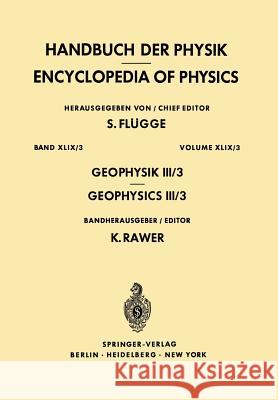Geophysics III/Geophysik III: Part III/Teil III » książka
Geophysics III/Geophysik III: Part III/Teil III
ISBN-13: 9783642806414 / Angielski / Miękka / 2012 / 558 str.
Sect. 14. 297 for such slow variations the effect described under 2. above will be by far the most predominant. In fact, the equipment provides a record of the time derivative of the element in question. 6) Records of the time derivatives of magnetic elements can, however, be obtained in a more direct way by recording directly the electromotive force (e. m. f. ) induced in suitably disposed coils by the variations of the geomagnetic field 10, 11. When a coil with the total winding area F is placed with its axis in the direction of a geomagnetic force component the variation of magnetic induction B with time will produce an electromotive force 1 dB 1 dH e=- coveu,uuFdT=- 'oV~,uQf1oFdT (i). )) . !. . =_to-13~ d(B/y) (1). )a) v em! d(tjs) in the coil. The e. mJ. may be amplified and recorded by means of an oscillograph or on a tape recorder. but more often the coil is used in connection with an ordinary galvanometer and the scale value of, for instance the dl1/dt record, will then - in the same way as the scale value of the magnet variometer treated in Subsect. IX - be dependent on the damping factor IX and on TO/T, where To and T are the oscillation periods for the undamped galvanometer and for the magnetic pulsation respectively. The amplitude recorded will be proportional to the amplification factor I, obtained from Eq. (1).











